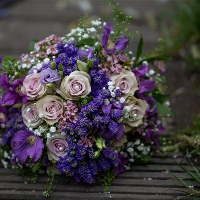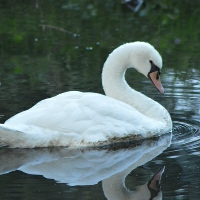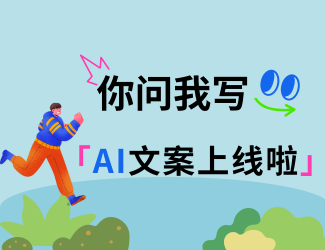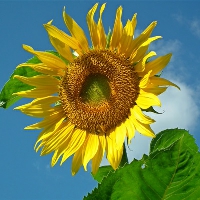双语格林童话:夏娃的孩子们
eve's unequal children
jacob and wilhelm grimm
when adam and eve were driven from paradise, they were forced to build a house for themselves on barren ground, and eat their bread by the sweat of their brow. adam hoed the field, and eve spun1 the wool. every year eve brought a child into the world, but the children were unlike each other. some were good looking, and some ugly.
after a considerable time had gone by, god sent an angel to them to announce that he himself was coming to inspect their household. eve, delighted that the lord should be so gracious, cleaned her house diligently2, decorated it with flowers, and spread rushes on the floor. then she brought in her children, but only the good-looking ones. she washed and bathed them, combed their hair, put freshly laundered3 shirts on them, and cautioned them to be polite and well-behaved in the presence of the lord. they were to bow down before him courteously4, offer to shake hands, and to answer his questions modestly and intelligently.
the ugly children, however, were not to let themselves be seen. she hid one of them beneath the hay, another in the attic5, the third in the straw, the fourth in the stove, the fifth in the cellar, the sixth under a tub, the seventh beneath the wine barrel, the eighth under an old pelt6, the ninth and tenth beneath the cloth from which she made their clothes, and the eleventh and twelfth under the leather from which she cut their shoes.
she had just finished when someone knocked at the front door. adam looked through a crack, and saw that it was the lord. he opened the door reverently7, and the heavenly father entered. there stood the good-looking children all in a row. they bowed before him, offered to shake hands, and knelt down.
the lord began to bless them. he laid his hands on the first, saying, "you shall be a powerful king," did the same thing to the second, saying, "you a prince," to the third, "you a count," to the fourth, "you a knight," to the fifth, "you a nobleman," to the sixth, "you a burgher," to the seventh, "you a merchant," to the eighth, "you a scholar." thus he bestowed9 his richest blessings10 upon them all.
when eve saw that the lord was so mild and gracious, she thought, "i will bring forth11 my ugly children as well. perhaps he will bestow8 his blessings on them too." so she ran and fetched them from the hay, the straw, the stove, and wherever else they were hidden away. in they came, the whole coarse, dirty, scabby, sooty lot of them.
the lord smiled, looked at them all, and said, "i will bless these as well."
he laid his hands on the first and said to him, "you shall be a peasant," to the second, "you a fisherman," to the third, "you a smith," to the fourth, "you a tanner," to the fifth, "you a weaver," to the sixth, "you a shoemaker," to the seventh, "you a tailor," to the eighth, "you a potter," to the ninth, "you a teamster," to the tenth, "you a sailor," to the eleventh, "you a messenger," to the twelfth, "you a household servant, all the days of your life."
when eve had heard all this she said, "lord, how unequally you spanide your blessings. all of them are my children, whom i have brought into the world. you should favor them all equally."
but god replied, "eve, you do not understand. it is right and necessary that the entire world should be served by your children. if they were all princes and lords, who would plant grain, thresh it, grind and bake it? who would forge iron, weave cloth, build houses, plant crops, dig ditches, and cut out and sew clothing? each shall stay in his own place, so that one shall support the other, and all shall be fed like the parts of a body."
then eve answered, "oh, lord, forgive me, i spoke12 too quickly to you. let your spanine will be done with my children as well."
亚当和夏娃被赶出乐园后,被迫在贫瘠的土地上建造自己的家园,躬耕劳作,养家糊口,亚当种地,夏娃纺织。他们每年都会有一个孩子降临人世,但这些孩子都各不相同,有的漂亮,有的难看。过了相当长的一段时间,上帝派了一名天使到人间,告诉他们自己将去看亚当全家。而夏娃呢,看到上帝如此宽厚仁慈,心情格外高兴,赶紧把房间打扫乾净,饰以花朵,铺以花毯。然后她把孩子们引进来,他们全是那些漂亮的娃娃。她给他们洗澡、梳头、穿衣,还教他们在上帝面前讲礼貌、懂规矩;学会在上帝面前彬彬有礼地鞠躬行礼,伸出双手谦虚谨慎地回答他提出的问题。然而那些难看的孩子们却不让出来见人,一个被藏在乾草下,一个躲在屋簷下,一个藏在草垛里,一个躲在壁炉中,一个藏在地窖里,一个躲在浴盆下,一个在酒桶下,一个在旧毛衣柜里,两个蒙在作衣服用的布料下,还有两个藏在夏娃做鞋用的皮革底下。她刚准备就绪,就听到了一阵敲门声。亚当从门缝里往外望去,一看来者正是上帝,便赶紧恭恭敬敬地开门,把上帝请了进来。上帝一进门就看见一排漂亮的娃娃在他面前又是鞠躬,又是伸手,又是下跪。於是上帝便开始赐福他们,他把手放在一个孩子的头上说:“你会成为一个统治四方的国王。”
接着又对另一个说:“你会成为一个王子。”“你会成为一个伯爵。”“你会成为一个骑士。”“你将成为一个贵族。”“你将成为一个镇民。”“你是个商人。”“你是一名学者。”……如此这般地把最好的祝福都给了那些漂亮的孩子们。夏娃看到上帝是如此地仁慈宽厚,便想:“如果我把那些丑娃娃也带出来,上帝可能也会赐福他们呢!”於是她赶紧把那些孩子找出来,只见他们从草堆里、茅草丛中、壁炉里还有其它地方纷纷钻了出来,一个个又髒、又破、又丑。上帝见了他们笑着说:“我会赐福这些孩子的。”
他又把手放在第一个孩子的头上说:“你会成为一名农夫。”“你会成为一名打鱼的。”“你会成为一名铁匠。”“你将是制革的。”“你是一名织工。”“你是一个鞋匠。”“你是一个裁缝。”“你是一名陶工。”“你是一个赶车的。”“你是一名海员。”“你是一名信差。”“你将有干不完的家务活。”……。夏娃听到这些赶紧说:“主啊!你的这些赏赐多么不公平!他们毕竟都是我的孩子,都是我把他们带到这个世界,你给予他们的恩赐应该相等才对呀!”但上帝回答说:“夏娃你可不懂。这些孩子们将世世代代生息繁衍下去,应该是这样,必须是这样。
如果他们都是皇亲国舅,那谁来种穀、打麦、磨面、做麵包呢?谁又是铁匠、织工、木匠、苦力和裁缝呢?每个人都有他自己的位置,这样才能互帮互助,就像大家都是一个身体里的胁骨互相支持着彼此一样。“夏娃忙说:”主啊,原谅我出口不逊吧,神祐我儿。
 一帆风顺 2024-04-19 12:59:39
一帆风顺 2024-04-19 12:59:39









